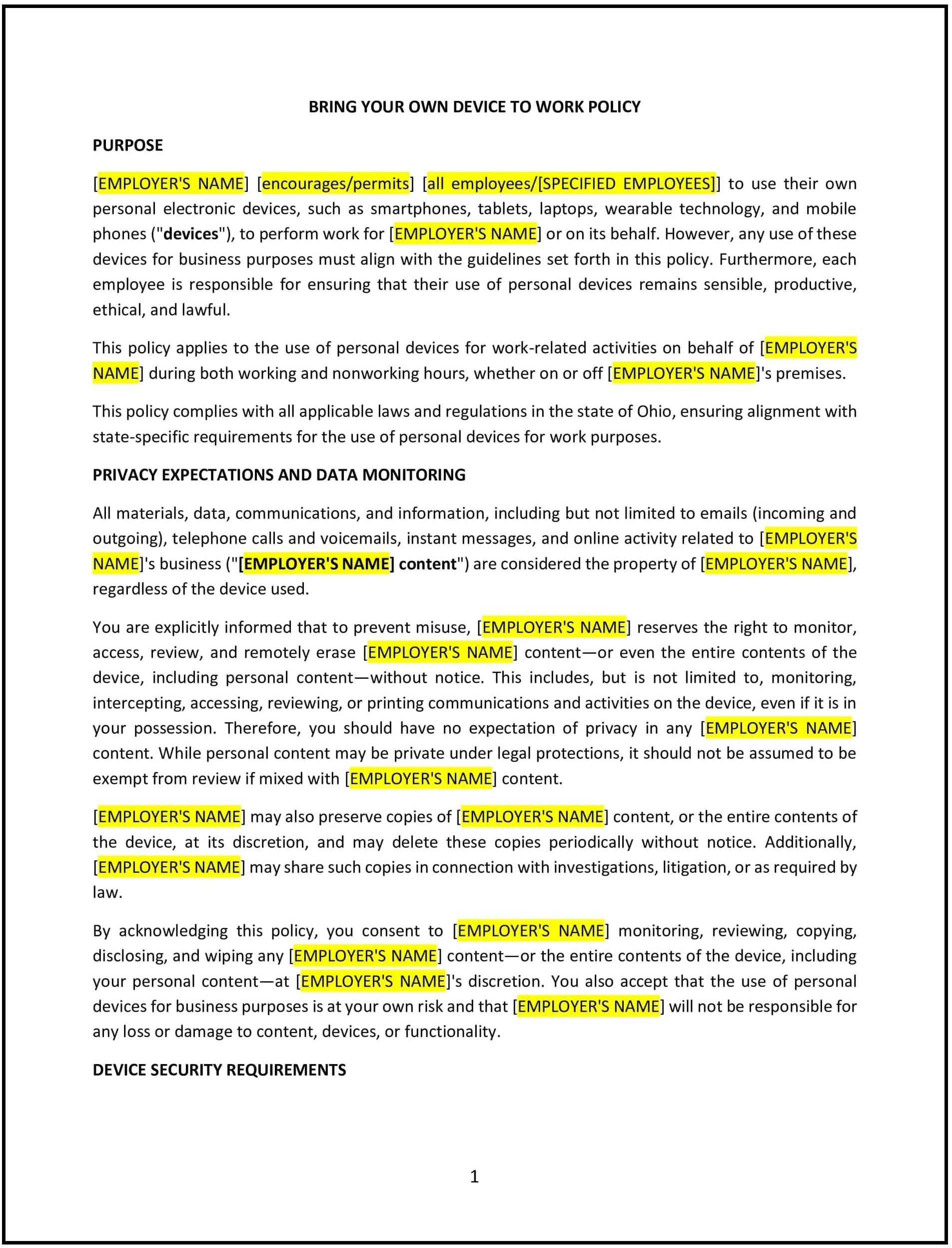Bring your own device to work policy (Ohio): Free template
Got contracts to review? While you're here for policies, let Cobrief make contract review effortless—start your free review now.

Customize this template for free
Bring your own device to work policy (Ohio)
A bring your own device (BYOD) to work policy outlines the guidelines for Ohio businesses allowing employees to use their personal devices, such as smartphones, laptops, and tablets, for work-related activities. The policy specifies the acceptable use of personal devices, security protocols, and the management of company data on employees’ personal devices. It aims to balance the convenience and flexibility of BYOD with the need to maintain security, privacy, and productivity in the workplace.
By implementing this policy, Ohio businesses can support employee preferences for using personal devices while safeguarding company information, reducing risks related to data breaches, and maintaining a secure working environment.
How to use this bring your own device to work policy (Ohio)
- Define acceptable device usage: The policy should outline which types of devices are acceptable for use, such as smartphones, tablets, and laptops. It should specify the types of activities that employees are allowed to perform on personal devices, including checking emails, accessing company files, or using company-approved apps.
- Establish security requirements: Clearly state the security measures employees must adhere to when using personal devices, such as installing antivirus software, using strong passwords, enabling device encryption, or updating software regularly.
- Define data protection protocols: Specify how company data should be handled on personal devices. The policy should address the use of cloud storage, file sharing, and remote access to ensure that company data is protected from unauthorized access or leaks.
- Outline device management procedures: Specify the steps the business will take to manage personal devices, such as installing mobile device management (MDM) software, monitoring devices for compliance with security protocols, and handling lost or stolen devices.
- Clarify the responsibilities of employees: The policy should clearly outline the responsibilities of employees, including ensuring that their devices are secure, notifying the company immediately if the device is lost or compromised, and complying with any updates or changes to security protocols.
- Address reimbursement or compensation: The policy should specify if the business will reimburse employees for any costs associated with using personal devices for work, such as phone plans, data usage, or device repairs.
- Ensure compliance with Ohio state laws: The policy should comply with Ohio state laws regarding privacy, data protection, and employee rights, while aligning with best practices in the industry for managing personal devices in the workplace.
- Review and update regularly: Regularly review and update the policy to ensure it aligns with changing technology, evolving security threats, and Ohio state laws related to data protection and employee rights.
Benefits of using this bring your own device to work policy (Ohio)
This policy provides several key benefits for Ohio businesses:
- Increases flexibility and employee satisfaction: BYOD policies allow employees to use devices they are familiar with and prefer, which can improve productivity and job satisfaction.
- Reduces company costs: Allowing employees to use their own devices can reduce the need for the business to provide and maintain company-owned devices, saving on hardware and maintenance costs.
- Improves productivity: Employees may feel more comfortable using their personal devices, which can lead to increased efficiency and faster response times for work-related tasks.
- Strengthens data security: By outlining specific security measures, businesses can reduce the risk of data breaches and unauthorized access to company data, even when employees use their personal devices.
- Enhances mobility and remote work capabilities: The policy supports flexible work environments by enabling employees to access work-related resources from any device, improving overall mobility and remote work capabilities.
- Promotes accountability: Clear guidelines and responsibilities for employees regarding the security and use of their devices help maintain a high level of accountability and ensure that personal devices are used appropriately for work tasks.
- Aligns with legal requirements: A well-defined BYOD policy ensures that businesses comply with Ohio state laws regarding employee privacy, data security, and consumer protection.
Tips for using this bring your own device to work policy (Ohio)
- Communicate the policy clearly: Ensure that all employees understand the BYOD policy by including it in the employee handbook, during onboarding, and in regular reminders or training sessions.
- Provide clear security guidelines: Offer clear instructions on how employees should secure their devices and protect company data, including step-by-step instructions for setting up security features like encryption and antivirus software.
- Ensure proper device management: Use mobile device management (MDM) software or other tools to monitor devices for compliance with security requirements and to remotely wipe data from lost or stolen devices.
- Address the potential for personal and work-related data overlap: Ensure that employees understand the difference between personal and work-related data on their devices and the importance of keeping them separate, particularly when it comes to using cloud services and apps.
- Be flexible and supportive: Recognize that employees may have different levels of comfort and familiarity with technology, and be open to providing support or assistance with setting up their devices in accordance with the policy.
- Regularly review the policy: Update the BYOD policy periodically to keep up with technological advances, new security threats, and any changes in Ohio state laws or industry standards regarding device usage and data protection.